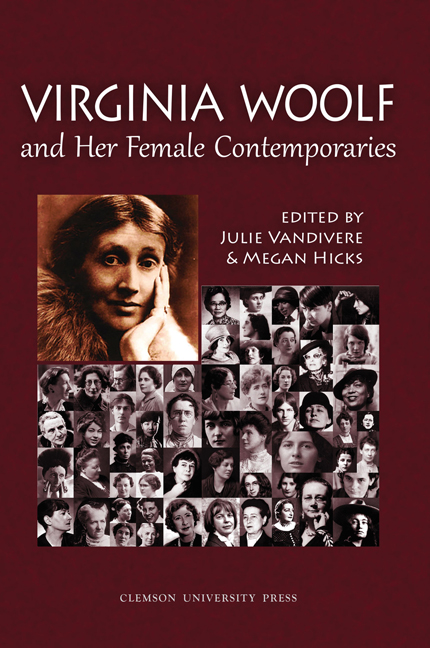Book contents
- Frontmatter
- Table of Contents
- Introduction
- Acknowledgments
- Abbreviations
- Who Are Virginia Woolf's Female Contemporaries?
- Virginia Woolf's Cultural Contexts
- Virginia Woolf and the Book Society Limited
- The Outsider as Editor: Three Guineas and the Feminist Periodical
- Woolf 's Imperialist Cousins: Missionary Vocations of Dorothea and Rosamond Stephen
- Mary Sheepshanks, Virginia Stephen, and Morley College: Learning to Teach, Learning to Write
- Moving Picture This: Virginia Woolf in the British Good Housekeeping!? or Moving Picture This: Woolf 's London Essays and the Cinema
- “Quota Quickies Threaten Audience Intelligence Levels!”: The Power of the Screen in Virginia Woolf 's “The Cinema” and “Middlebrow” and Betty Miller's Farewell Leicester Square
- Virginia Woolf's Contemporaries Abroad
- Virginia Woolf's Contemporaries at Home
- Tribute to Jane Marcus
- Notes on Contributors
- Conference Program 223
Woolf 's Imperialist Cousins: Missionary Vocations of Dorothea and Rosamond Stephen
from Virginia Woolf's Cultural Contexts
- Frontmatter
- Table of Contents
- Introduction
- Acknowledgments
- Abbreviations
- Who Are Virginia Woolf's Female Contemporaries?
- Virginia Woolf's Cultural Contexts
- Virginia Woolf and the Book Society Limited
- The Outsider as Editor: Three Guineas and the Feminist Periodical
- Woolf 's Imperialist Cousins: Missionary Vocations of Dorothea and Rosamond Stephen
- Mary Sheepshanks, Virginia Stephen, and Morley College: Learning to Teach, Learning to Write
- Moving Picture This: Virginia Woolf in the British Good Housekeeping!? or Moving Picture This: Woolf 's London Essays and the Cinema
- “Quota Quickies Threaten Audience Intelligence Levels!”: The Power of the Screen in Virginia Woolf 's “The Cinema” and “Middlebrow” and Betty Miller's Farewell Leicester Square
- Virginia Woolf's Contemporaries Abroad
- Virginia Woolf's Contemporaries at Home
- Tribute to Jane Marcus
- Notes on Contributors
- Conference Program 223
Summary
Perhaps not surprisingly, two of Virginia Woolf 's female cousins—the daughters of Leslie Stephen's brother James Fitzjames Stephen—espoused their father's faith in the British Empire's superiority and its colonial obligations in the waning decades of British rule. Though Dorothea (1871–1965) and Rosamond (1868–1951) added a Christian missionary zeal Fitzjames had abandoned early in his career, both chose to pursue vocations in countries (India and Ireland) in which their father had worked and lived and about which he deplored democratic reform in letters to The Times. Here I examine Woolf 's lifelong hostility to Dorothea and Rosamond in light of their work in British India and Ireland from the early 1900s to the 1930s. My goal is less to vindicate Dorothea and Rosamond than to present them as paradoxically conservative and progressive examples of a British ethos during an era of war and crumbling empire.
Dorothea, youngest of the ten Stephen children, was born in India in July 1871 during her father's two-year residence in Calcutta as legal member of the Colonial Council (1869–1872). As an adult, Dorothea would spend twenty-three years (1914–1937) in southern India near Madras as a Christian theology teacher and writer of several religious books, the best known of which, Studies in Early Indian Thought (1919), received a lukewarm review in the Times Literary Supplement. After Fitzjames returned from India, the family spent every summer from 1875 to 1892 at Anaverna in Ravensdale, County Louth, Ireland. Rosamond Stephen, who would later live in Belfast from 1912 to 1919 and then in Dublin until 1932, traced her vocation as an active Church of Ireland worker to her childhood visits to the Roman Catholic cottagers on the county estate her family rented. She recorded over three decades of her life in Ireland during the turbulent times before the Easter Rebellion of 1916 through the establishment of the Irish Free State in 1921 and the Constitution of Eire in 1937 in a mostly unpublished, two-volume, typescript manuscript she titled The Record.
- Type
- Chapter
- Information
- Virginia Woolf and Her Female Contemporaries , pp. 62 - 68Publisher: Liverpool University PressPrint publication year: 2016



